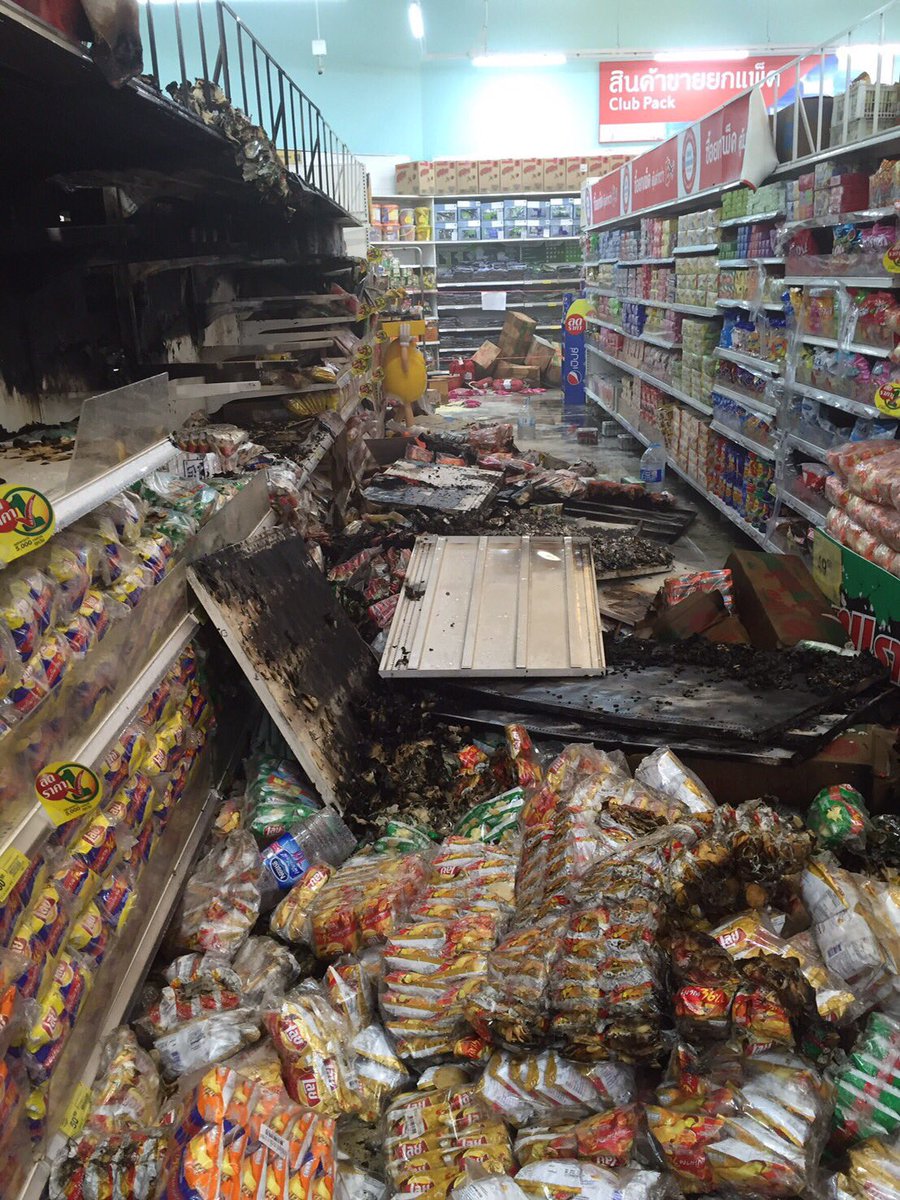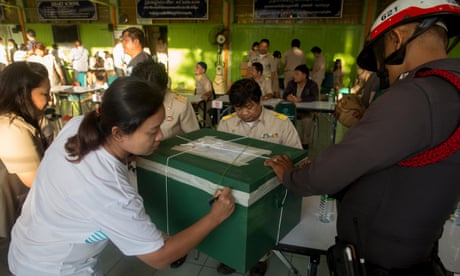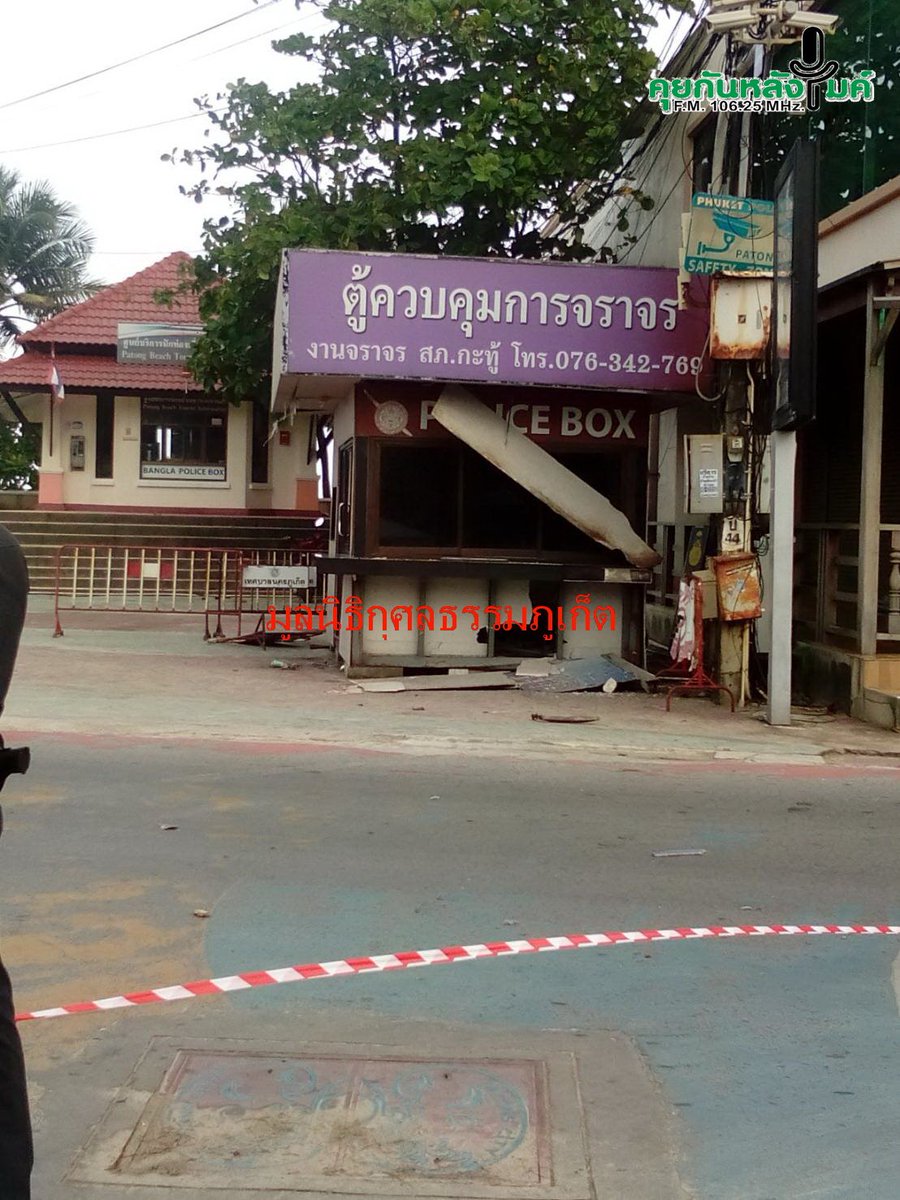Tourist towns of Phuket and Hua Hin in Thailand hit by deadly explosions
Fears of further bombings after two sets of explosions are heard on Thursday and Friday in Hua Hin and Phuket

A series of apparently coordinated blasts detonated across Thailand has killed at least four people and injured dozens, including in the tourism hotspots of Hua Hin and Phuket.
The attacks took place late on Thursday and into Friday morning with Thai police being put on alert for further explosive devices.
A Thai street vendor in Hua Hin was killed and at least 19 people were wounded, including seven foreigners, when two bombs hidden in plant pots exploded just before midnight on Thursday in a busy bar street.

One man also was killed and five others wounded when a device exploded in Trang, a province in Thailand’s south, close to the house of the provincial police chief, local media reported.
Early on Friday, another two blasts occurred in Hua Hin, which lies about 200km (120 miles) south of Bangkok with one reported fatality.
Further south on Phuket island, a blast was reported on Patong beach, a resort area on the west coast popular with foreign tourists. There were further reports of explosions in Surat Thani, where one person was killed, and a number of blasts in Phang Nga.
— Glyn T. Davies (@GlynTDavies)August 12, 2016
Our hearts go out to families of killed, to injured, & all affected by horrific bombings in Hua Hua Hin, Trang & Surat Thani.
The blasts, which appear to have been coordinated to target tourist hotspots around the country, took place just a few days before the first anniversary of a devastating bombing at a Hindu shrine in Bangkok that killed 22 people and wounded more than 100.
At the time Thai authorities said that attack was motivated by a criminal gang angered by a police crackdown on their people smuggling operations. The blast was never formally claimed by any group.
The latest bombings have not been claimed by any group yet but Thai authorities were quick to blame “local sabotage”.
The Thai prime minister and leader of the military junta, Prayut Chan-o-cha, has ordered security to be increased across urban areas and areas popular with tourists but also called for calm.
“The bombs are an attempt to create chaos and confusion,” Prayut was quoted by AFP as saying. “We should not make people panic more.”
“Why have the bombs occurred as our country is heading towards stability, a better economy and tourism – and who did it? You have to find out,” he added.
The bombings will dent arrivals of visitors this summer. Tourism accounts for 10% of the country’s gross domestic product.
The British government advised against travel to public places in the vicinity of Hua Hin and urged travellers to follow the advice of local authorities.
A statement read: “We are seeking further information following incidents in Hua Hin in Thailand. We stand ready to provide assistance to any British nationals involved.”
 — Richard Barrow (@RichardBarrow)August 12, 2016
— Richard Barrow (@RichardBarrow)August 12, 2016
Photos of the fire at Tesco Lotus in Nakhon Si Thammarat. Police find suspicious object (Via@Chu_SpringNews) pic.twitter.com/r9cK5oLiaW
Hua Hin, a town that sits on the Gulf of Thailand, is popular with weathly Thais from the capital who buy apartments in high-rise blocks overlooking the sea.
Hundreds of European retirees have made Hua Hin their home, enjoying the wide sandy beach as a younger generation of kite surfers exploit the onshore winds.
The aftermath of the first bombing on Thursday night was witnessed by tourist Shane Brett who told the Australian Broadcasting Corporation that there was panic.
“I was at a bar in the main bar district in Hua Hin right outside the Hilton Hotel and at first I heard kind of a bang ... and everyone kind of panicked,” Brett said.
He looked outside the bar and said he saw people running. Half an hour later, he made it back to his hotel. On the way, he said he saw “a good few people injured and the whole area just panicking ... the whole area was just shut down with police cars, ambulances.”
“The type of bomb is still under investigation,” Hua Hin’s police chief, Sitthichai Srisopacharoenrat, told AFP after the initial blasts.
“One Thai woman was killed and altogether from the two bombs 19 people were injured,” said another local officer.
“Three are in serious condition and seven of the injured are foreigners – four women and three men,” he told AFP, adding the two blast sites were 50 metres (160ft) apart.
Photos showed emergency workers taking victims from the area on stretchers and foreign tourists with minor cuts and injuries gathered at a local hospital.
Although it was not clear who is behind the attack, the timing suggested it might be an effort to embarrass the military government that took power two years ago. In a speech on Wednesday night prime minister Prayuth hadtaken credit for bringing stability back to Thailand after an extended period of unrest.
The attacks took place late on Thursday and into Friday morning with Thai police being put on alert for further explosive devices.
A Thai street vendor in Hua Hin was killed and at least 19 people were wounded, including seven foreigners, when two bombs hidden in plant pots exploded just before midnight on Thursday in a busy bar street.

One man also was killed and five others wounded when a device exploded in Trang, a province in Thailand’s south, close to the house of the provincial police chief, local media reported.
Early on Friday, another two blasts occurred in Hua Hin, which lies about 200km (120 miles) south of Bangkok with one reported fatality.
Further south on Phuket island, a blast was reported on Patong beach, a resort area on the west coast popular with foreign tourists. There were further reports of explosions in Surat Thani, where one person was killed, and a number of blasts in Phang Nga.
— Glyn T. Davies (@GlynTDavies)August 12, 2016
Our hearts go out to families of killed, to injured, & all affected by horrific bombings in Hua Hua Hin, Trang & Surat Thani.
The blasts, which appear to have been coordinated to target tourist hotspots around the country, took place just a few days before the first anniversary of a devastating bombing at a Hindu shrine in Bangkok that killed 22 people and wounded more than 100.
At the time Thai authorities said that attack was motivated by a criminal gang angered by a police crackdown on their people smuggling operations. The blast was never formally claimed by any group.
The latest bombings have not been claimed by any group yet but Thai authorities were quick to blame “local sabotage”.
The Thai prime minister and leader of the military junta, Prayut Chan-o-cha, has ordered security to be increased across urban areas and areas popular with tourists but also called for calm.
“The bombs are an attempt to create chaos and confusion,” Prayut was quoted by AFP as saying. “We should not make people panic more.”
“Why have the bombs occurred as our country is heading towards stability, a better economy and tourism – and who did it? You have to find out,” he added.
The bombings will dent arrivals of visitors this summer. Tourism accounts for 10% of the country’s gross domestic product.
The British government advised against travel to public places in the vicinity of Hua Hin and urged travellers to follow the advice of local authorities.
A statement read: “We are seeking further information following incidents in Hua Hin in Thailand. We stand ready to provide assistance to any British nationals involved.”
 — Richard Barrow (@RichardBarrow)August 12, 2016
— Richard Barrow (@RichardBarrow)August 12, 2016Photos of the fire at Tesco Lotus in Nakhon Si Thammarat. Police find suspicious object (Via@Chu_SpringNews) pic.twitter.com/r9cK5oLiaW
Hua Hin, a town that sits on the Gulf of Thailand, is popular with weathly Thais from the capital who buy apartments in high-rise blocks overlooking the sea.
Hundreds of European retirees have made Hua Hin their home, enjoying the wide sandy beach as a younger generation of kite surfers exploit the onshore winds.
The aftermath of the first bombing on Thursday night was witnessed by tourist Shane Brett who told the Australian Broadcasting Corporation that there was panic.
“I was at a bar in the main bar district in Hua Hin right outside the Hilton Hotel and at first I heard kind of a bang ... and everyone kind of panicked,” Brett said.
He looked outside the bar and said he saw people running. Half an hour later, he made it back to his hotel. On the way, he said he saw “a good few people injured and the whole area just panicking ... the whole area was just shut down with police cars, ambulances.”
“The type of bomb is still under investigation,” Hua Hin’s police chief, Sitthichai Srisopacharoenrat, told AFP after the initial blasts.
“One Thai woman was killed and altogether from the two bombs 19 people were injured,” said another local officer.
“Three are in serious condition and seven of the injured are foreigners – four women and three men,” he told AFP, adding the two blast sites were 50 metres (160ft) apart.
Photos showed emergency workers taking victims from the area on stretchers and foreign tourists with minor cuts and injuries gathered at a local hospital.
Although it was not clear who is behind the attack, the timing suggested it might be an effort to embarrass the military government that took power two years ago. In a speech on Wednesday night prime minister Prayuth hadtaken credit for bringing stability back to Thailand after an extended period of unrest.
 — Richard Barrow (@RichardBarrow)August 12, 2016
— Richard Barrow (@RichardBarrow)August 12, 2016Explosion at Patong beach & bomb found at Loma, Phuket this morning (Via @Thairath_News)pic.twitter.com/Q98pf2KOde
The first blasts also took place on the eve of the birthday of Queen Sirikit in a town where she and King Bhumibol Adulyadej maintain a summer palace. The ruling junta has declared that defending the monarchy is its priority, especially as there is concern about the process to succeed the ailing 88-year-old king, who is the world’s longest reigning monarch.
Prayuth’s speech was to mark the success of a referendum on Sunday that approved his government’s proposed new constitutionthat is supposed to lead to an election next year. Critics of the charter say it is undemocratic and was fashioned to keep the military in control for at least five more years even if a free election is held.
Trang however is on the fringes of Thailand’s deep south, where a low-level Muslim separatist insurgency has killed more than 5,000 since 2004. Almost all the violence has been in the three southernmost provinces, which Trang does not directly abut. Thailand has been troubled by political violence, including bombings, for much of the past decade.
Thaksin Shinawatra was ousted as prime minister in a 2006 military coup after demonstrations accused him of corruption, abuse of power and insulting King Bhumibol. His removal set off sometimes bloody battles for power between his supporters and opponents, who include the military. His sister Yingluck Shinawatra, who became prime minister in 2011, was ousted in a 2014 army takeover.
Comments
Post a Comment